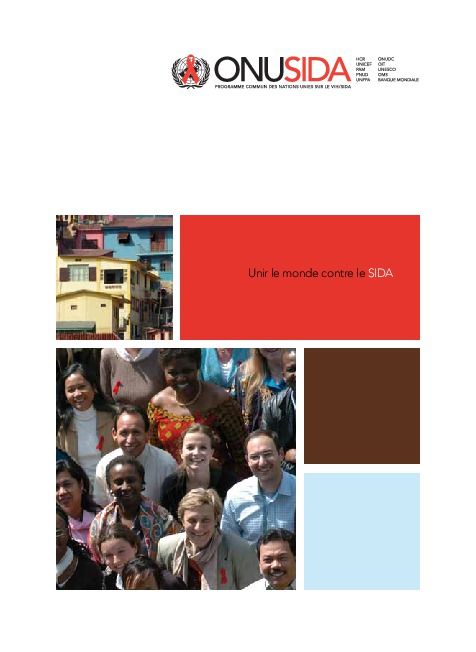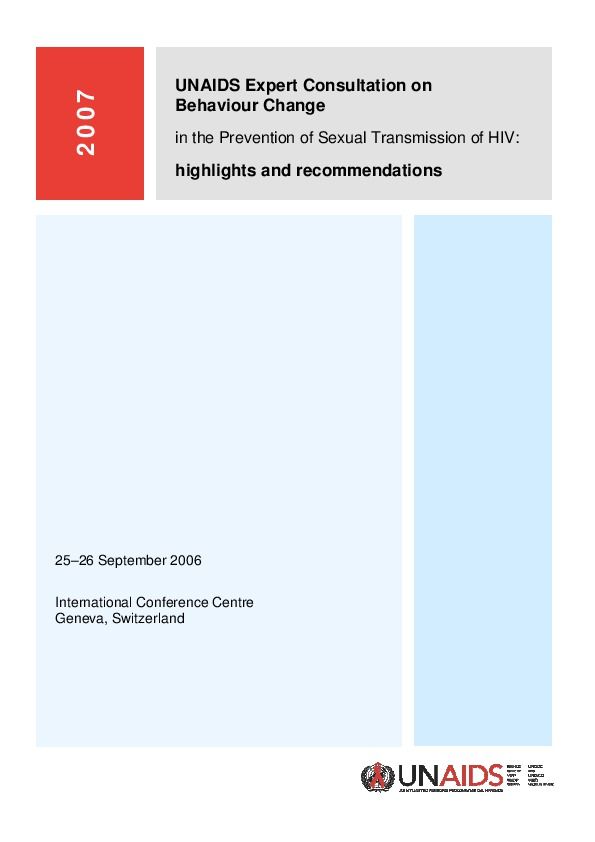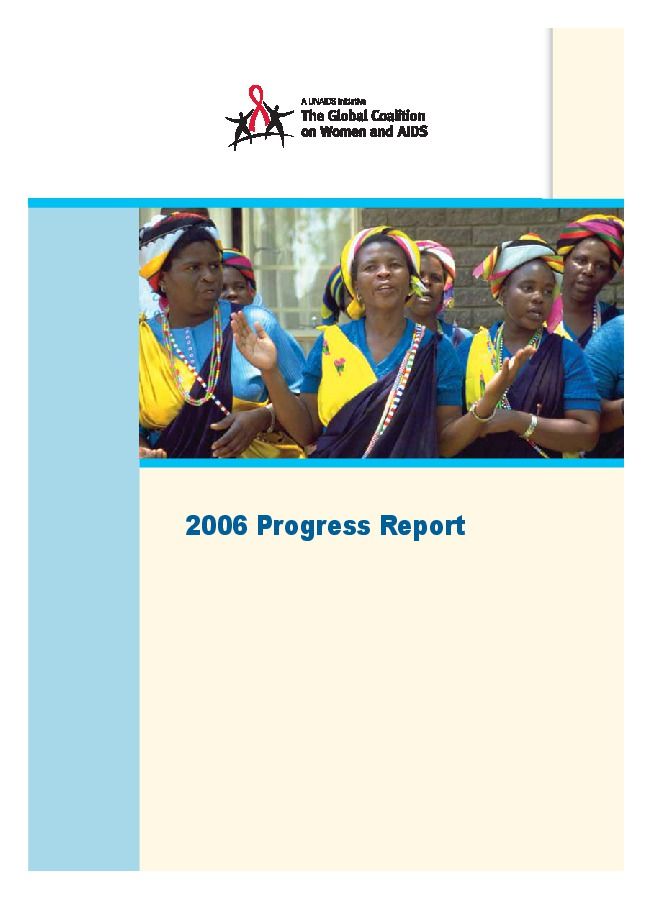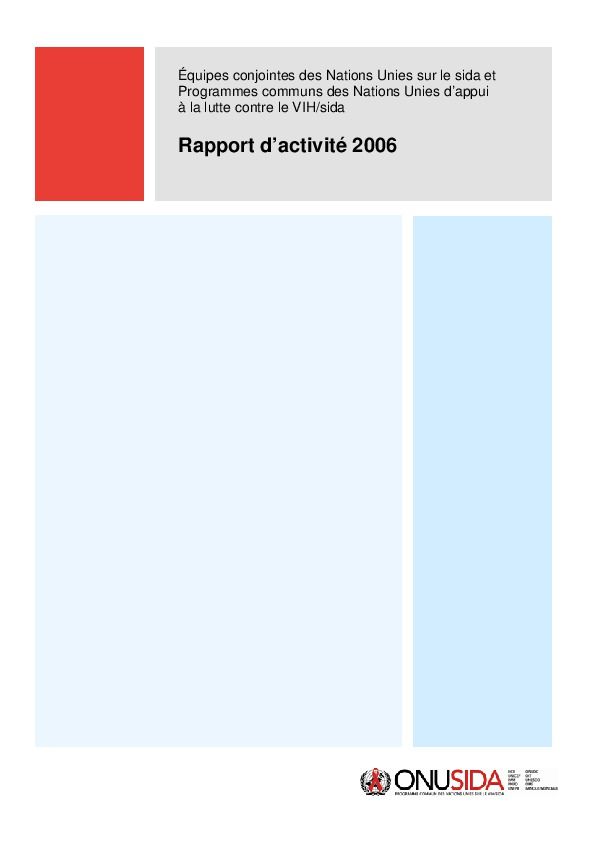Documents
Brochure du travail géneral de l´ONUSIDA
11 avril 2007
L’ONUSIDA et ses dix Coparrainants se sont engagés
à ‘Unir le monde contre le SIDA’ et à contribuer à mettre en place une riposte durable au SIDA. Pour cela, nous devons travailler ensemble et avec tous les partenaires de la riposte au SIDA, afin d’édifier une coalition mondiale unie et élargie en vue de réaliser des objectifs véritablement partagés.
Documents
UNAIDS Expert Consultation on Behaviour Change Report
30 avril 2007
UNAIDS convened an expert consultation on Behaviour Change in the Prevention of Sexual Transmission of HIV in collaboration with the US Office of the Global AIDS Coordinator on 25-26 September 2006. 26 experts from 17 countries joined UNAIDS for the consultation to reconsider the state of knowledge about behaviour change measures for the prevention of sexual transmission of HIV. The objective of the meeting was to create a forum for dialogue about the evidence and the priorities to prevent sexual transmission, to pinpoint a few concrete barriers to behaviour change that can be overcome, and to seek a practical way forward to innovate and test or expand some promising new approaches to behavioural change.
Documents
Vers l’accès universel à la prévention, au traitement et aux soins : expériences et défis dans la région de Mbeya en Tanzanie — Etude de cas
09 mai 2007
Au cours des cinq dernières années, la Tanzanie est intervenue de manière significativement plus efficace face à l’épidémie de VIH. Cette étude de cas sur l’action entreprise dans la région de Mbeya fournit un descriptif et un bilan des activités menées depuis près de 20 ans en matière de lutte contre le VIH. Dans le Sud-Ouest de la Tanzanie, foyer de plus de 2 millions de personnes, constitue depuis toujours l’une des régions les plus touchées du pays. La prévalence du VIH parmi la
population sexuellement active a atteint son pic au milieu des années 90 avec plus de 20 % enregistrés alors. Cependant, le processus épidémique a été inversé. Il est fort probable que le Programme régional de lutte contre le sida de la région de Mbeya, dont les activités ont débuté en 1988, a contribué à la chute des
chiffres enregistrés.
Documents
Rapport annuel de l’ONUSIDA 2006 : faire travailler l’argent disponible
31 mai 2007
L’année 2006 a été marquée par un nouvel engagement politique relatif à la prévention du VIH et aux moteurs de l’épidémie, tels que le statut inférieur des femmes et des fi lles. Nous avons également vu la réforme des Nations Unies en action, avec la mise en oeuvre des recommandations de la Cellule mondiale de réfl exion pour une meilleure coordination entre les organismes multilatéraux et les donateurs internationaux dans la riposte au sida qui appelaient à l’établissement d’équipes conjointes des Nations Unies sur le sida dans les pays et à une meilleure répartition des tâches parmi les Coparrainants et autres parties prenantes de la riposte au sida.
Documents
GCWA - Progress Report 2006
11 juin 2007
This report provides a broad overview of the major activities of the Global Coalition Secretariat and convening agencies over 2006. Its achievements, however, resonate beyond its own specific activities. The Global Coalition has helped shape the global advocacy agenda around women and AIDS and embed these messages and strategies in major global and regional policies. National coalitions on women and AIDS formed in countries ranging from Haiti to Nigeria and regional coalitions have also been formed in the Caribbean.
Documents
Équipes conjointes des Nations Unies sur le sida et Programmes communs des Nations Unies d’appui à la lutte contre le VIH/sida 2006
19 juin 2007
Les progrès réalisés dans la mise en place des Équipes conjointes des Nations Unies sur le sida et des Programmes communs des Nations Unies d’appui à la lutte contre le VIH/sida sont considérables : les deux tiers des Équipes des Nations Unies dans les pays ayant fait l’objet d’une enquête en janvier 2007 avaient déjà constitué des Équipes conjointes, et plus de la moitié d’entre elles comptaient déjà un Programme commun. Pour la plupart des pays, la concrétisation de ces équipes et programmes représente une évolution naturelle de leurs systèmes existants.
Documents
Outil d’harmonisation et d’alignement national (CHAT)
21 juin 2007
Un instrument destiné à relever les défis de l’harmonisation et de l’alignement grâce à l’évaluation des forces et de l’efficacité des partenariats dans la riposte nationale au sida. L’Outil d’harmonisation et d’alignement national (CHAT) a été conçu pour aider les autorités nationales sida et leurs partenaires à évaluer le niveau de participation et d’engagement de la riposte nationale au sida et le degré d’harmonisation et d’alignement des partenaires internationaux. Le CHAT permettra d’estimer l’adhésion
des partenaires aux « Trois Principes » et l’adhésion des partenaires internationaux aux engagements fi gurant dans la Déclaration de Paris sur l’efficacité de l’aide (2005). Grâce à sa fonction de « baromètre » de la situation en matière d’harmonisation et d’alignement au niveau des pays et en identifi ant où se situent les obstacles réels ou perçus comme tels, le CHAT peut servir d’outil de plaidoyer pour instaurer un dialogue et entraîner une amélioration de la riposte au sida.
Documents
Art et sida
27 juin 2007
Le Programme commun des Nations Unies sur le VIH/sida (ONUSIDA) a commémoré son 10ème anniversaire en 2006. Au mois de novembre de cette année-là, le Programme a emménagé dans son nouveau siège à Genève, un bâtiment qu’il partage avec l’Organisation mondiale de la Santé. Pour l’ONUSIDA, ce nouvel espace constitue un lieu de rencontre pour une intensifi cation du dialogue sur les questions entourant le sida et un centre pour la collection ‘Art et sida’. La collection de l’ONUSIDA ‘Art et sida’ est composée de pièces de qualité muséale qui suscitent réfl exion et dialogue. Portant initialement sur l’art et les artistes africains, les
pièces ont été rassemblées grâce au soutien généreux des artistes, de collectionneurs et de donateurs.
Documents
Report of the Twentieth Meeting of the UNAIDS Programme Coordinating Board
26 juillet 2007










